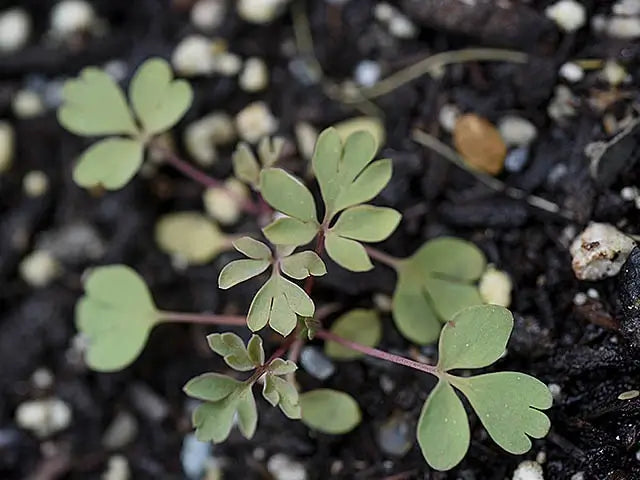
Tempted to go native in your garden? Seeds are a super way to start. Thanks to the new movement to nurture native plants in our gardens, seeds of all-time favorites like milkweeds and native lupines are readily available. Or, you could send for seeds through the mail. Whichever way you go, you’ll be getting the quantities of plants your pollinators will love without stretching your garden budget. However, growing seeds of wild plants is a little different than sowing your typical garden variety marigolds and zinnias. Here are the secrets to success:

Read and Heed the Packet
Seeds of perennial wild plants often require a chilling period to trick them into thinking that they’ve spent winter braving the elements outdoors. Different plants require a varied number of days or weeks of cold treatment usually between 10 days to 3 months. That info should be revealed on the seed packet. If it’s not spelled out or if you collected seeds from your own plants, search Google for instructions. Also check out suggested methods of chilling. You could accomplish the feat outdoors or use your refrigerator. In addition, members of the pea family (like lupines, baptisias, and senna) often like to be jumpstarted by soaking the seeds. Again, the seed packet will reveal how many hours of soaking is necessary. And fine seeds, such as columbines and nicotianas, prefer to be sown on the soil surface or just barely covered with soil. If so, the seed packet should let you know, often revealing their preference as “these seeds need light to germinate.

Finding the Right Seed Blend
The soil that you select for starting your seeds can spell the difference between success and failure. Fortunately, the folks at Coast of Maine have you covered with Coast of Maine’s Sprout Island Blend Seed Starter. They’ve created a mix formulated to please the sprouting preferences for a wide variety of seeds. Not only does it provide the perfect medium for sprouting, it also features just the right balance of drainage to water retention for the early stages of your seedlings’ growth from birth right up through kindergarten. The last thing you need is to try and care for a nursery full of thirsty plants begging for continual drinks – the right seed mix drains well but doesn’t dry out continually.

Be Patient
Wild native seeds are a little different than your typical garden-variety plants that have been carefully crafted to sprout simultaneously. Native seeds sometimes take longer to sprout, even when given ideal conditions. Not only do they take longer, they often germinate sporadically. Seeds of the same species sown side-by-side might sprout weeks apart. So don’t give up hope and don’t toss your seed flat when only a couple of seedlings have begun growth. And don’t panic when new sprouts look entirely different than the mature plant. Not only are first leaves often drastically different (the initial sprout of a lupine, for example, looks nothing like the mature leaves), but second leaves are sometimes unlike the final version (baptisia is a good example).

The Next Step
When most of the seed flat has sprouted and developed its second set of leaves, prick out the seedlings and pot them in individual containers using Coast of Maine Bar Harbor Blend Organic Potting Soil. According to your preference (and how many seedlings actually sprouted), you can plant the seedlings singly in their pots or double them up for a fuller, bushier final product. Then, acclimate them to life outdoors when temperatures are reliably above freezing. Keep in mind that native plants have adapted to your climate, so they tend to acclimate easily. However, they need to be “hardened off” by putting the seedlings in a shady spot for a few days and protecting them from sudden ups and downs in temperature. After that adjustment period and when the weather has stabilized, they should be fine with being established in their permanent location. Congratulations! You’ve just made a major contribution to your ecosystem with more fodder for your native pollinators!
Written by award winning author, Tovah Martin. Photos also taken by Tovah Martin. Find her books and more information on her website: tovahmartin.com.













